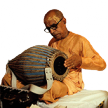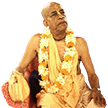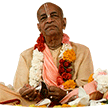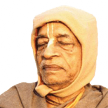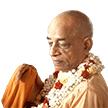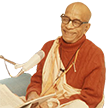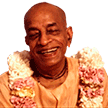Bharadvaja - a glorious personality: Difference between revisions
(Created page with "Category:Glorious Personalities Category:Glorious Personalities from Bhagavad Gita Category:Glorious Personalities from Srimad Bhagavatam Category:Glorious Perso...") |
No edit summary |
||
| Line 10: | Line 10: | ||
{{Personalitiesnav}} | {{Personalitiesnav}} | ||
<!----------------- BEGIN STANDARD HEADING -----------------> | <!----------------- BEGIN STANDARD HEADING -----------------> | ||
Srila Prabhupada's books, lectures, conversations and letters reveal the qualities of this glorious personality as seen in the Vaniquotes '''[[Vaniquotes:Category:Bharadvaja|Bharadvaja]]''' category. An introduction from his teachings is given below in the following | Srila Prabhupada's books, lectures, conversations and letters reveal the qualities of this glorious personality as seen in the Vaniquotes '''[[Vaniquotes:Category:Bharadvaja|Bharadvaja]]''' category. An introduction from his teachings is given below in the following 8 quotes. | ||
<!----------------- END STANDARD HEADING -----------------> | <!----------------- END STANDARD HEADING -----------------> | ||
---- | ---- | ||
== Quotes from Srila Prabhupada's teachings == | == Quotes from Srila Prabhupada's teachings == | ||
<!----------------- edit quote boxes below this line -----------------> | <!----------------- edit quote boxes below this line -----------------> | ||
{{VaniQuotebox| | {{VaniQuotebox|He (Bharata, the son of Sakuntala) performed many great sacrifices, in which he gave great riches in charity to the brahmanas. This chapter ends by describing the birth of Bharadvaja and how Maharaja Bharata accepted Bharadvaja as his son|After Mahārāja Duṣmanta's death, Bharata, the son of Śakuntalā, was enthroned. He performed many great sacrifices, in which he gave great riches in charity to the brāhmaṇas. This chapter ends by describing the birth of Bharadvāja and how Mahārāja Bharata accepted Bharadvāja as his son. '''(Śrīmad-Bhāgavatam 9.20 Summary )'''}} | ||
{{VaniQuotebox| | {{VaniQuotebox|Sometimes he (Bhrgu) instructed Bharadvaja Muni about astronomical evolution, and he is the author of the great Bhrgu-samhita, the great astrological calculation|Sometimes he instructed Bhāradvāja Muni about astronomical evolution, and he is the author of the great Bhṛgu-saṁhitā, the great astrological calculation. He explained how air, fire, water and earth are generated from ether. He explained how the air in the stomach works and regulates the intestines. As a great philosopher, he logically established the eternity of the living entity (Mahābhārata). He was also a great anthropologist, and the theory of evolution was long ago explained by him. '''(Śrīmad-Bhāgavatam 1.19.9-10)'''}} | ||
{{VaniQuotebox| | {{VaniQuotebox|The seven stars revolving around the polestar at the zenith are called saptarsi-mandala. On these seven stars, which form the topmost part of our planetary system, reside seven sages: Kasyapa, Atri, Vasistha, Visvamitra, Gautama, Jamadagni and Bharadvaja|The seven stars revolving around the polestar at the zenith are called saptarṣi-maṇḍala. On these seven stars, which form the topmost part of our planetary system, reside seven sages: Kaśyapa, Atri, Vasiṣṭha, Viśvāmitra, Gautama, Jamadagni and Bharadvāja. These seven stars are seen every night, and they each make a complete orbit around the polestar within twenty-four hours. '''(Śrīmad-Bhāgavatam 9.16.24)'''}} | ||
{{VaniQuotebox| | {{VaniQuotebox|The seventh Manu, who is the son of Vivasvan, is known as Sraddhadeva. In this manvantara, or reign of Manu the seven sages are known as Kasyapa, Atri, Vasistha, Visvamitra, Gautama, Jamadagni and Bharadvaja|The seventh Manu, who is the son of Vivasvān, is known as Śrāddhadeva. He has ten sons, named Ikṣvāku, Nabhaga, Dhṛṣṭa, Śaryāti, Nariṣyanta, Nābhāga, Diṣṭa, Tarūṣa, Pṛṣadhra and Vasumān. In this manvantara, or reign of Manu, among the demigods are the Ādityas, Vasus, Rudras, Viśvedevas, Maruts, Aśvinī-kumāras and Ṛbhus. The king of heaven, Indra, is known as Purandara, and the seven sages are known as Kaśyapa, Atri, Vasiṣṭha, Viśvāmitra, Gautama, Jamadagni and Bharadvāja. '''(Śrīmad-Bhāgavatam 8.13 Summary )'''}} | ||
{{VaniQuotebox| | {{VaniQuotebox|Sanatana Gosvami and Rupa Gosvami belonged to the Bharadvaja-gotra, which indicates that they belonged either to the family or disciplic succession of Bharadvaja Muni|Sanātana Gosvāmī and Rūpa Gosvāmī belonged to the Bharadvāja-gotra, which indicates that they belonged either to the family or disciplic succession of Bharadvāja Muni. As members of the Kṛṣṇa consciousness movement we belong to the family, or disciplic succession, of Sarasvatī Gosvāmī, and thus we are known as Sārasvatas. '''(Caitanya-caritāmṛta, Ādi-līlā 10.84)'''}} | ||
{{VaniQuotebox| | {{VaniQuotebox|On these seven stars reside seven sages: Kasyapa, Atri, Vasistha, Visvamitra, Gautama, Jamadagni and Bharadvaja. These seven stars are seen every night, and they each make a complete orbit around the polestar within twenty-four hours|The seven stars revolving around the polestar at the zenith are called saptarṣi-maṇḍala. On these seven stars, which form the topmost part of our planetary system, reside seven sages: Kaśyapa, Atri, Vasiṣṭha, Viśvāmitra, Gautama, Jamadagni and Bharadvāja. These seven stars are seen every night, and they each make a complete orbit around the polestar within twenty-four hours. '''(Śrīmad-Bhāgavatam 9.16.24)'''}} | ||
{{VaniQuotebox| | {{VaniQuotebox|Bharadvaja: He is one of the seven great rsis and was present at the time of the birth ceremony of Arjuna. The powerful rsi sometimes undertook severe penances on the shore of the Ganges, and his asrama is still celebrated at Prayagadhama|Bharadvāja: He is one of the seven great ṛṣis and was present at the time of the birth ceremony of Arjuna. The powerful ṛṣi sometimes undertook severe penances on the shore of the Ganges, and his āśrama is still celebrated at Prayāgadhāma. It is learned that this ṛṣi, while taking bath in the Ganges, happened to meet Ghṛtacī, one of the beautiful society girls of heaven, and thus he discharged semen, which was kept and preserved in an earthen pot and from which Droṇa was born. '''(Śrīmad-Bhāgavatam 1.9.6-7)'''}} | ||
{{VaniQuotebox| | {{VaniQuotebox|All the sages like Parvata Muni, Narada, Dhaumya, Vyasa the incarnation of God, Brhadasva, Bharadvaja and Parasurama and disciples, Vasistha, Indrapramada, Trita, Grtsamada, Asita, Kaksivan, Gautama, Atri, Kausika and Sudarsana were present (with Bhisma)|All the sages like Parvata Muni, Nārada, Dhaumya, Vyāsa the incarnation of God, Bṛhadaśva, Bharadvāja and Paraśurāma and disciples, Vasiṣṭha, Indrapramada, Trita, Gṛtsamada, Asita, Kakṣīvān, Gautama, Atri, Kauśika and Sudarśana were present. '''(Śrīmad-Bhāgavatam 1.9.6-7)'''}} | ||
<!----------------- edit quote boxes above this line -----------------> | <!----------------- edit quote boxes above this line -----------------> | ||
Latest revision as of 02:05, 24 December 2016
INTRODUCTION TEXT TO BE WRITTEN
Srila Prabhupada's books, lectures, conversations and letters reveal the qualities of this glorious personality as seen in the Vaniquotes Bharadvaja category. An introduction from his teachings is given below in the following 8 quotes.
Quotes from Srila Prabhupada's teachings
Bharadvaja - explore more within this category.
Vanipedia has now over 215 introductory articles compiled from Srila Prabhupada's teachings under the series titled Glorious Personalities. All these articles can be seen in the Table of Content on the right side of this article and also here in this Umbrella Category. Browse through them to relish the breadth and depth of Srila Prabhupada's teachings - There is an attractive personality for everyone.
